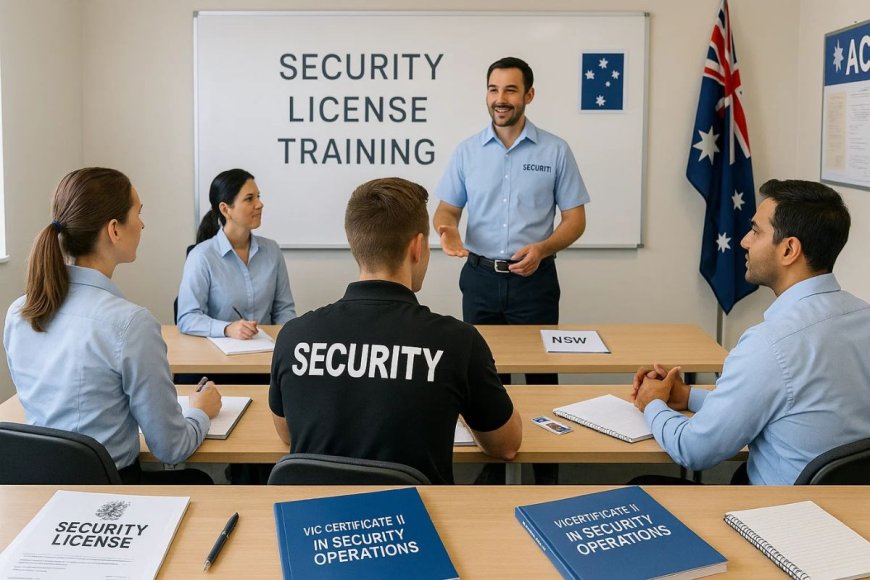How to Become a Security Guard in Australia: A Complete Guide
Discover the complete guide on how to become a security guard in Australia. Learn about training, licensing, job prospects, and industry insights in this expert blog.

Introduction to the Security Industry in Australia
The security industry in Australia plays a vital role in maintaining public safety and order. From shopping centers and concerts to corporate offices and government properties, trained security guards are in constant demand. Whether you're just starting out or seeking a career change, entering the security field offers job stability and various growth opportunities. Australia has clear guidelines and licensing procedures for individuals wishing to become professional security guards. Understanding these prerequisites is essential before taking the plunge into this dynamic profession.
Why Choose a Career in Security?
Becoming a security guard offers more than just a job; it provides a platform for developing interpersonal, observational, and crisis-management skills. Many individuals are drawn to the profession for its diversity in roles, ranging from patrolling premises to providing crowd control at large-scale events. The job also offers flexible hours, competitive pay, and the possibility to work in various environments. Moreover, it serves as a stepping stone to other sectors within the law enforcement and safety industry, such as corrections or police services.
Eligibility Requirements for Becoming a Security Guard
To pursue a career in security in Australia, candidates must meet certain eligibility criteria. These typically include being at least 18 years old, having a clean criminal record, and possessing the right to work in Australia. Additionally, strong communication skills and physical fitness are often necessary. Some employers may require candidates to have a valid drivers license or be willing to work night shifts and weekends. These foundational requirements are the first step toward enrolling in accredited security training courses.
Accredited Security Training and Courses
Security guards must complete a nationally recognized training program to qualify for a license. The most common certification is the Certificate II in Security Operations, which covers topics such as patrolling techniques, responding to security risks, managing conflict, and operating basic security equipment. Training is offered by Registered Training Organisations (RTOs) across Australia. After successful course completion, candidates can apply for a security license through the relevant state or territory authority.
Understanding State Licensing Requirements
Each Australian state and territory has specific licensing requirements for security guards. For example, licensing in Victoria is handled by Victoria Police Licensing & Regulation Division, while in New South Wales, it's managed by SLED (Security Licensing & Enforcement Directorate). Applicants are required to submit identification, proof of training, and background checks, including fingerprinting in some cases. It's crucial to familiarize yourself with your state's specific requirements to avoid delays in obtaining your license.
Key Responsibilities of a Security Guard
Security guards are responsible for a wide range of duties depending on their work environment. These responsibilities may include monitoring surveillance systems, patrolling property, managing access control, and responding to alarms or emergencies. In retail settings, guards may focus on loss prevention, while in events, they are tasked with crowd control and ensuring attendee safety. The role demands vigilance, quick decision-making, and strong interpersonal skills.
Specializations Within the Security Sector
Security guarding is not a one-size-fits-all profession. You can specialize in areas such as mobile patrol, static guarding, crowd control, close personal protection, or control room operations. Each specialization may require additional certification or training. For example, if you're interested in event security, training in crowd control and conflict resolution becomes essential. Those seeking event-focused roles can explore opportunities like event security services in Melbourne, which demand specialized expertise.
Physical and Mental Fitness Requirements
While you dont need to be an athlete, a good level of physical and mental fitness is important for most security roles. Physical tasks might include patrolling large areas, standing for extended periods, or intervening in conflicts. Mental fitness involves staying calm under pressure, assessing risks quickly, and making sound decisions. Many training programs include physical drills and simulated scenarios to prepare you for real-life security challenges.
Career Advancement Opportunities
Security guarding can lead to numerous career advancement options. With experience, you can move into supervisory or managerial positions, or even start your own security firm. Additional training and licenses can qualify you for specialized roles such as armed security, private investigation, or control room management. Some professionals use their experience to transition into law enforcement or emergency services. A security career can grow as your skills and qualifications evolve.
Industry Demand and Job Outlook
The demand for trained security guards continues to grow in Australia due to increased concerns over safety, crime, and the need for crowd management at public events. Government buildings, retail centers, educational institutions, and healthcare facilities all require vigilant security personnel. According to national employment forecasts, the security industry is expected to expand steadily, providing ample opportunities for new entrants. This is especially true in metropolitan areas like Sydney, Melbourne, and Brisbane.
Salary Expectations and Benefits
Entry-level security guards in Australia typically earn between $25 to $30 per hour. With experience and additional certifications, this figure can rise significantly. Special event roles or assignments in high-risk environments may offer premium rates. Along with financial benefits, many positions include additional perks such as travel allowances, overtime pay, and training reimbursements. Employers often support ongoing professional development to help guards advance their careers.
How to Find a Job as a Security Guard
Once you're trained and licensed, the next step is to find suitable employment. Job boards, security companies, and recruitment agencies often list openings for licensed security guards. It's also beneficial to network with industry professionals and attend security expos or job fairs. Companies such as Security Guard Services Australia offer nationwide job placements and resources for aspiring guards. Tailoring your resume to highlight relevant training and soft skills can increase your chances of being hired.
Legal and Ethical Considerations
Security guards must adhere to strict ethical and legal standards. Misuse of authority, negligence, or violation of privacy laws can lead to license suspension or legal action. Guards must understand their rights and limitations, including the use of reasonable force and citizens arrest protocols. Training programs emphasize ethical conduct and provide guidance on lawful behavior during duty. Maintaining professionalism at all times is critical in building trust and credibility within the community.
Technology and Tools Used by Modern Security Guards
Todays security professionals use an array of tools to enhance their effectiveness. From body-worn cameras and metal detectors to real-time communication apps and automated surveillance systems, technology is integral to modern security. Training often includes modules on using these tools properly. Guards must also stay updated with emerging technologies that could impact their role. Digital reporting systems, AI-driven surveillance, and mobile security apps are rapidly transforming the industry.
Steps to Get Started in the Industry
To sum it up, here are the key steps:
-
Ensure you meet the eligibility requirements.
-
Complete the required security training from a recognized RTO.
-
Apply for a license through your state authority.
-
Explore job opportunities via agencies or companies like this career guide.
-
Continue learning and advancing through specializations or additional qualifications.
Frequently Asked Questions (FAQs)
1. How long does it take to become a licensed security guard in Australia?
Generally, the process can take 6 to 10 weeks, including training, certification, and licensing approval.
2. Is prior experience required to become a security guard?
No, but having customer service or law enforcement experience can be beneficial.
3. Do I need a separate license for crowd control roles?
Yes, crowd control often requires an additional certification or license endorsement.
4. Can I work as a security guard while studying?
Yes, many security jobs offer flexible shifts that can complement a student schedule.
5. Is the job physically demanding?
Some roles can be physically intense, especially those requiring patrols or crowd management.
6. Are there part-time security guard jobs in Australia?
Yes, part-time and casual roles are widely available, especially in events and retail security.








































